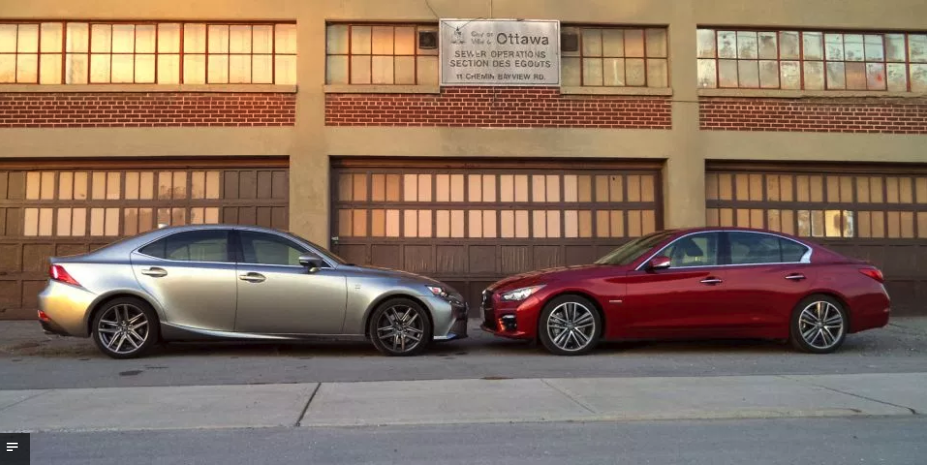Comparo: 2014 Infiniti Q50 Hybrid vs. 2014 Lexus IS 350

Story and photos by John LeBlanc
It’s all thanks to the success of BMW’s 3 Series sedan — arguably the vehicle that invented the entry-level sports sedan segment in the mid-1980s — that we’re now evaluating the all-new 2014 Infiniti Q50 Hybrid AWD Sport and equally fresh 2014 Lexus IS 350 AWD F-Sport.
For three generations now (since the first-generation 2000 Lexus IS and the Q50’s predecessor, the Infiniti G35 in 2002), this pair of Japanese sports sedans have been keenly aimed at the entry-level sports sedan class leader from Munich. And both have arrived for 2014 as all-new models, loaded with technology, power and the promise of excellent driving dynamics. So we had to ask: which one is the best “Japanese” entry-level sports sedan?
FIRST PLACE: 2014 Lexus IS 350 AWD F-Sport
Starting at $39,495 (all prices include freight and pre-delivery inspection), the base model, rear-wheel-drive 2014 Lexus IS 250 is identically priced to its Infiniti counterpart. But at $52,795, our topline IS 350 AWD F-Sport/Premium Package enjoys a slight price advantage over its $54,145 Q50 Hybrid AWD Sport rival.
The Lexus gets the upper hand as soon as one opens its doors. The IS 350 AWD F-Sport’s front left seat is more driver-oriented; the ergonomics are also more functional. Compared to the Q50’s unorganized control layout, the IS interior designers have grouped the various HVAC, audio and driving controls in logical groupings. Unlike the Infiniti, it’s much easier to find the right knob or button in the Lexus in a quick and efficient manner.
While the IS 350’s carryover 3.5-litre six-cylinder gas engine sports only 306 horsepower and 277 pound-feet of torque, aided by a swift-shifting eight-speed automatic gearbox, the V6 is equally as smooth and debonair in its actions as the more powerful Infiniti’s gas-electric module.
More responsive is the IS 350 AWD F-Sport’s steering and handling. Primarily using a shrunken-down version of the well-regarded Lexus GS platform, the smaller IS is noticeably more nimble than the larger and heavier Q50. The Lexus’s variable-ratio steering can feel too light. But once you exit the urban jungle to find some twisty back roads, the system hastens its reactions, making the Lexus sports sedan quite alert and responsive.
The IS 350 AWD F-Sport’s cornering attitude is more predictable and flatter than what drivers will find in the Q50 Hybrid AWD Sport. However, unlike the Infiniti’s too-stiff ride, when you’ve decided you’re done playing amateur racer and get back on the highway, you'll appreciate Lexus’s velvety ride quality. We’ll give credit to the F-Sport’s Adaptive Variable suspension and the lessons Lexus engineers learned from big brother GS.
In the end, driving enthusiasts will find the 2014 IS 350 AWD F-Sport the more rewarding entry-level Japanese sports sedan to drive, free of the technology intrusions found in our second-place finisher.
SECOND PLACE: 2014 Infiniti Q50 Hybrid AWD Sport
Infiniti’s latest entry-level sedan certainly makes a statement about its luxury priorities. The five-passenger, four-door Q50 sports sedan is a bit larger than the outgoing G37 and comes with a phalanx of new safety, convenience and performance technologies showcasing the brand’s high-tech ambitions.
The model best equipped to take on the Lexus IS 350 AWD F-Sport is the top-line Q50 Hybrid AWD Sport. From the driver’s seat, the Q50 feels more expansive than the more cockpit-like feel of the IS 350. And although we found some of the buttons and dials in odd and unintuitive places, the Infiniti’s interior build quality is just a bit tighter than in the Lexus. Plus rear passengers will appreciate the Q50’s extra legroom over the IS.
Infiniti has been adamant that the “Hybrid” part of the Q50’s badge is more about performance than saving fuel. Using the same gas-electric powertrain as the larger Infiniti M Hybrid sedan — an electric motor sandwiched between a 3.5-litre six-cylinder gas engine and a seven-speed automatic transmission — the Q50 Hybrid makes 360 horsepower. Not only is that 32 hp up on the gas-only Q50, but also 54 more than the IS 350 AWD F-Sport.
As such — and despite weighing in at a hefty 1,880 kilograms, 185 more than the lighter IS — the Q50 hybrid scoots a half second sooner in the zero to 100 kilometres per hour run than the Lexus, taking only 5.3 seconds. Supporting the “hybrid as a performance car” ethos, in our week with the car, we averaged 11.1 litres per 100 km; well short of the Infiniti’s 7.5 city and 6.3 estimates, and only fractionally better than the gas-only Lexus’s 11.5 L/100 as-tested figure.
Not only is the Infiniti quicker in a straight line than the Lexus, but it’s also arguably a better luxury sedan. The Q50’s hybrid system toggles back and forth between its gas and electric power seamlessly. To the point where you’ll forget it’s a hybrid. At highway speeds, the Infiniti is quieter than the Lexus, aided in some cases when its powertrain can run silently on electric power alone.
In the end, as a “luxury” car, the new 2014 Q50 Hybrid AWD Sport is quite nice. But once the road starts to turn and weave and bob, the Lexus IS 350 AWD F-Sport is simply a more natural and rewarding sports sedan to drive.




